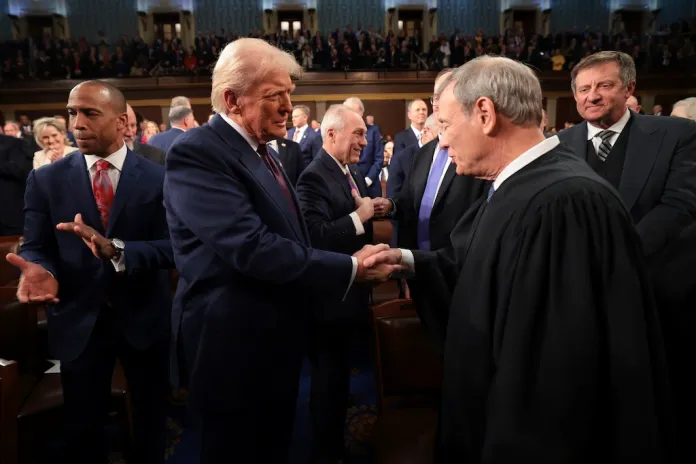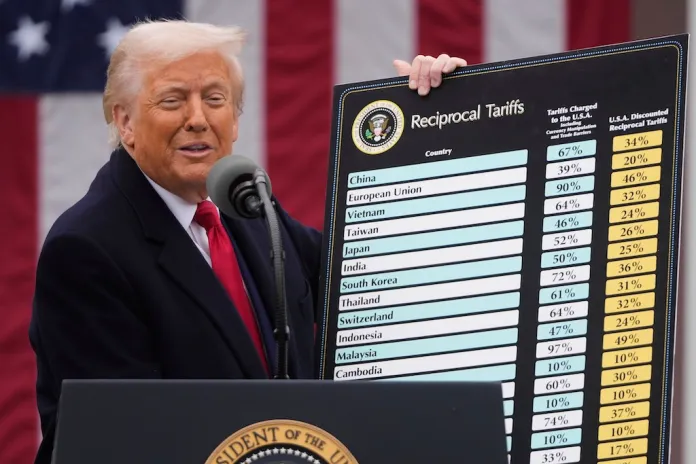President Donald Trump has racked up wins on the Supreme Court‘s emergency docket, but as cases involving the president’s agenda begin to reach the high court’s merits docket, he could be handed some losses by the justices.
The Justice Department faces its first major test at the Supreme Court under the second Trump administration Wednesday when the president’s tariffs come under scrutiny. The Trump cases likely to make their way to the justices following tariffs are also poised to ding the administration’s record at the high court.
Trump has racked up several wins on the emergency docket
Since returning to the White House, the Trump administration has faced significant pushback in federal courts over his agenda and executive actions, but overwhelmingly they have been successful in their petitions to the Supreme Court’s emergency docket to lift lower court injunctions.
The administration has gone to the Supreme Court with an emergency request 22 times since January, with the high court handing them at least a partial win in 19 of those instances.

The administration has won petitions on the emergency docket on a range of issues, including massive cuts to the federal workforce, ending temporary protective status for Venezuelan migrants, and multiple firings of independent agency heads.
Solicitor General D. John Sauer last saw defeat on the emergency docket in May, when the high court paused the deportation of a group of Venezuelan nationals under the Alien Enemies Act in Texas. Justices Clarence Thomas and Samuel Alito dissented from the decision by the other seven justices on the high court.
Richard Pierce, a law professor at George Washington University, told the Washington Examiner he believes the “extreme success” the administration has seen on the emergency docket stems from the “extreme success” of opponents of the president forum shopping, by filing lawsuits in courts with left-leaning benches.
While the Trump administration has largely succeeded in getting lower court injunctions halted with the petitions it does bring to the Supreme Court, it is not bringing every single negative ruling against them to justices.
“They took only about maybe 20, 25% of them at most, and I’m sure they chose partly based on how important the issue was to the Trump administration, but also partly based on their level of confidence that they’d win,” Pierce said.
Jonathan Adler, a professor at William & Mary Law School, also opined that the administration has only brought a “small sliver” of cases to the high court’s emergency docket, at a Federalist Society event days before the Supreme Court’s term began. He said the administration has been “very strategic” with the cases it brings to the Supreme Court’s emergency docket, mainly arguing that lower courts were overly aggressive with their actions.
As the lawsuits challenging the policies make their way through the lower courts toward the justices, they will not be able to be as selective with which cases to seek review at the high court if they want to uphold the agenda items being challenged. With some of these lawsuits on the merits docket, it could lead to some high profile losses for the administration.
Upcoming cases could ding Trump’s winning streak
Trump’s agenda faces its first major test before the high court Wednesday, when the justices hear arguments over whether his “Liberation Day” tariffs were lawfully enacted. The administration was handed a pair of losses in different federal district courts, along with a loss at the U.S. Court of Appeals for the Federal Circuit, leading to the consolidated challenge the justices will hear on the duties imposed by the president on most countries’ imports into the U.S.
With the combined cases of Learning Resources v. Trump and Trump v. V.O.S. Selections, the question of whether Trump can levy tariffs under the International Emergency Economic Powers Act will be at the center of arguments.
While the Justice Department has asserted that the president is afforded tariff powers under the law, groups challenging the president’s tariffs as unlawful point out tariff powers are not explicitly mentioned in IEEPA.
“The biggest reason is that the statute doesn’t say tariffs. I know that the president’s argument is that the statute allows the president to regulate the importation, but it doesn’t say tariffs,” Oliver Dunford, a senior lawyer with the Pacific Legal Foundation told the Washington Examiner.

“And there are loads of other statutes in the U.S. Code that do mention tariffs or duties. And so it seems unlikely that Congress would include the specific tariff power in all of those statutes, but not included in IEEPA,” Dunford, who led an amicus brief opposing the administration’s stance on IEEPA to the Supreme Court, said.
Pierce predicted that the administration is likely to lose the tariff case at the high court, also pointing to the lack of explicit tariff power in IEEPA and noting the conservative majority are “really dedicated textualists.”
“He really has quite a bit of an uphill battle in persuading them that a statute that says nothing at all about tariffs confers on him the power to issue tariffs,” Pierce said.
While the tariffs case appears to not favor the administration, Pierce believes Trump will likely win the next case he has before the justices. The next Trump case the high court is scheduled to hear on the merits involves his firing of FTC commissioner Rebecca Slaughter, in a case elevated from the emergency docket.
The Justice Department has argued that the president may fire executive agency heads, like FTC commissioners, without cause, and the high court has allowed those firings to move forward in three instances on the emergency docket – seemingly hinting at how it will rule on the merits docket.
Based on the trio of emergency docket rulings, the Supreme Court appears poised to overrule its 1935 precedent in Humphrey’s Executor v. United States with the Slaughter case. In Humphrey’s Executor, the high court found that then-President Franklin Delano Roosevelt could not fire an FTC commissioner at his discretion and could only fire him “for cause,” as outlined in the law passed by Congress authorizing the creation of the FTC.
Trump cases on the horizon also
While the two Trump cases currently on the high court’s arguments calendar appear likely to be a mixed bag for the administration, there could be future tough cases for the president on the horizon.
The Justice Department has asked the Supreme Court to review a ruling striking down the president’s January executive order limiting birthright citizenship to not include children born to parents who are both noncitizens or both non-permanent residents.
Trump has lost each of the various lawsuits levied against this order since January, and it would be an uphill battle at the high court – if they agree to take it up. While the justices could reject taking up the DOJ’s current petitions to hear the case, Pierce predicted the Supreme Court will have to take up the issue “at some point” and it will likely be a loss for Trump.
“I’d be very surprised if the administration could get five votes for a pretty radical change in people’s understanding of birthright citizenship,” Pierce told the Washington Examiner. “So I think eventually he’ll probably lose on that, but who knows when that’ll happen.”
One recurring theme of Trump’s actions in his second term is enacting policy via provisions of law activated by emergency declarations, including the sweeping tariffs using IEEPA and his deployment of the National Guard to various cities to protect federal immigration operations. During the tariff arguments this week, the high court could address the question of whether courts may question that judgement.
Dunford pointed to Trump’s recent imposition of additional tariffs on Canada, over an anti-tariff advertisement featuring a speech from former President Ronald Reagan, as evidence for the alleged baselessness of the declared emergency the administration has cited to impose tariffs using IEEPA, and questioned how the high court could address finding ‘baseless” emergencies as such.
“The problem for the court is, how do you say that in a way that can apply to future cases? In other words, how can the court say, we know this isn’t an emergency, but we can’t really define it or articulate a test for future courts to figure out when an emergency can be addressed by a court,” Dunford told the Washington Examiner. “And so that’s part of the challenge of the court, that emergencies are generally unreviewable.”
Pierce said he will be “looking very carefully” at the high court’s reasoning in its opinion in the tariffs to see where the justices are on the issue of whether or not to review a president’s emergency declaration.
“Trump is, more than any president in history, relying on direct actions by the president under one of the 137 statutes that confer emergency power on the president,” Pierce noted. “And so the big question there is, how is the court going to approach that whole big group of cases?”
“And how deferential will they be to the president in the context of all of these actions that he has taken based on his claim that he’s acting in an emergency,” he added.
SUPREME COURT COULD LOAD UP ON GUN CASES THIS TERM
During Trump’s first term he had a mixed record at the Supreme Court, but between when Trump was first sworn in as president in January 2017 and today, the high court has welcomed four new justices and veered more conservative.
The tariffs case on Wednesday and the Slaughter case next month will be the first tests for the administration on the merits docket, but with lawsuits continuing to rain down on Trump’s agenda, it appears likely the administration will face several more tests over the next three years.
